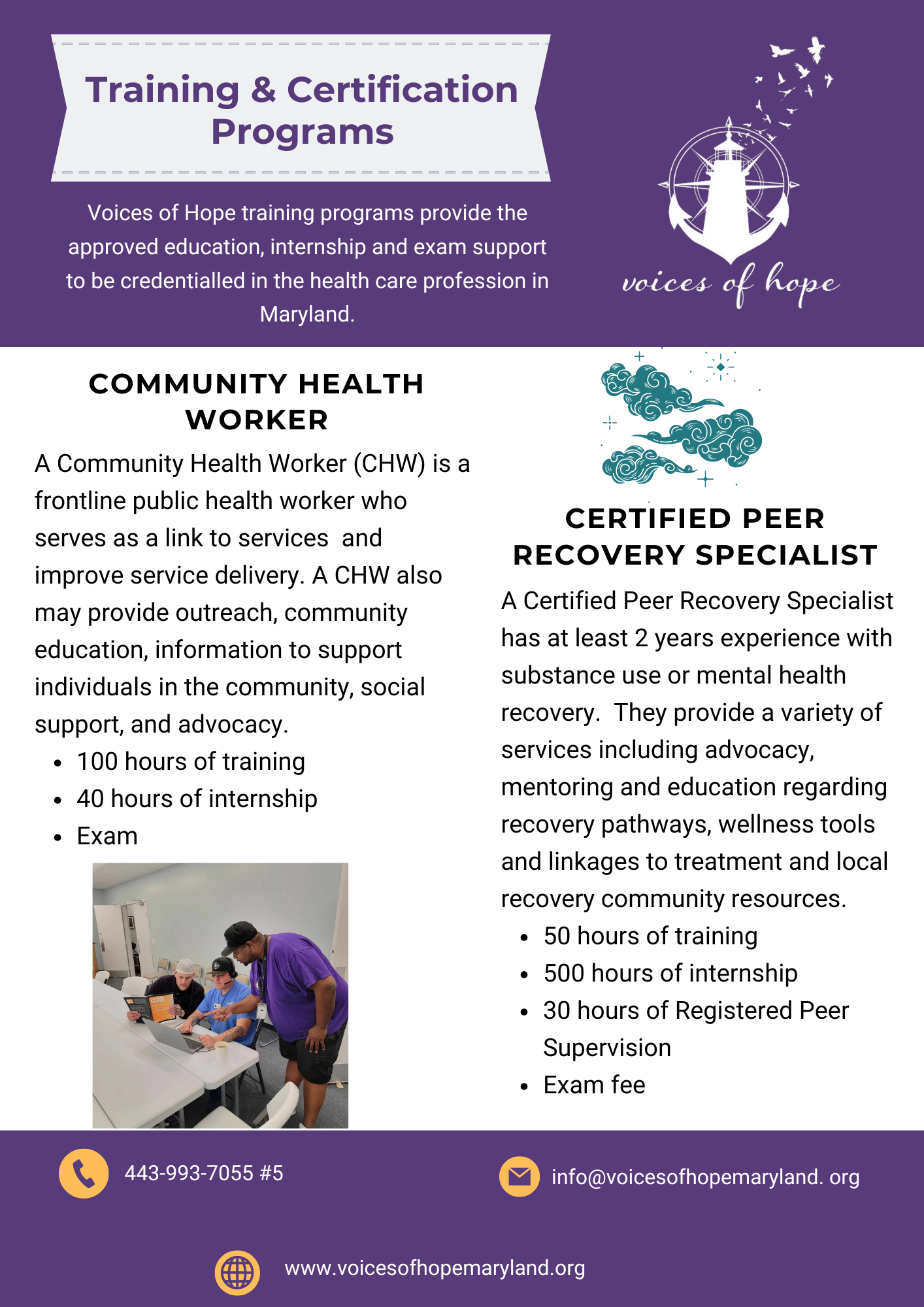Community Health Worker Certification
Want a career helping people get connected to care, resources, and real support?
A Community Health Worker (CHW) is someone who helps people in the community navigate health and social services—without the medical jargon and runaround.
CHWs are often trusted community members who:
Help people find the right services (healthcare, housing, food, treatment, benefits, etc.)
Explain information in a way that actually makes sense
Provide support, encouragement, and advocacy
Do outreach and health education in the community
You may also hear CHWs called patient navigators, outreach workers, health educators, community health advisors, and more.
Requirements (Maryland)
To earn CHW Certification in Maryland, you must complete:
100 hours of training
40 hours of internship/practicum
Pass the CHW certification exam
To enroll, you must:
Be 18 or older
Have a high school diploma or GED
(No GED yet? Don’t panic—we can help connect you to resources while you’re working toward it.)
What you’ll learn in Voices of Hope’s CHW Program
Our CHW training builds real-world skills so you’re ready to work in the field. You’ll cover things like:
Professionalism, ethics, and confidentiality
Communication skills
Wellness
Community outreach and resource navigation
And more…
Internships/practicum hours can be completed at:
A Voices of Hope center, or
A partner organizations across Maryland
Maryland CHW Core Competencies
During training and practicum, you’ll build skills in:
Advocacy & helping communities build strength
Clear communication
Cultural awareness and respectful support
Ethics & confidentiality
Finding resources and helping people navigate systems
Care coordination support
Teaching/coaching for healthier choices
Outreach strategies
Public health basics and health literacy
Ready to enroll?
Step 1: Fill out the CHW Interest Form
Click CHW Program Interest Form and submit your info.
What happens next:
You’ll receive an email (usually within 1 business day) with exactly where to start.
📞 Questions? Call (443) 993-7055 and select option 5.
FAQs
-
The program cost is about $2,500. Most participants use workforce funding (WIOA) or grant funding, so the training ends up being free to the student.
-
Register with your county’s American Job Center
Attend their orientation
Get assigned an employment specialist/counselor
Request funding for the Voices of Hope Community Health Worker Training Program
Once approved, send us your funding verification to finalize enrollment
-
Reach out anyway. We can suggest other options and help you explore different funding paths. If you got denied in one place, it can still be worth checking another—rules and eligibility can vary.
-
Yes. Some employers will pay for certification training. Ask your supervisor or HR department. If they can’t, we’ll point you toward workforce funding options.
-
Yes. Voices of Hope is an accredited Maryland CHW training program.
-
Yes. While funding is processing, you can attend free webinars/open trainings when available.
After you submit the Interest Form, you’ll be added to our training email list so you can see what opens up. (Seats can fill, so nothing is guaranteed until you’re fully enrolled.) -
After you submit the Interest Form, you’ll get an email with steps to begin. Since enrollment is rolling, you can apply anytime.
-
No. There is no recovery-time requirement for CHW. This track is open to anyone who wants to do community health outreach and support.
-
CHW is a broader pathway and does not require recovery experience. It includes community health and public health topics, and many people use it as a stepping stone into the field. Some folks later transition into CPRS once they meet CPRS requirements.
-
It depends on your schedule and how quickly you complete your trainings and practicum hours. Many students finish in a 6-9 months.
-
We’ll coordinate your 40-hour practicum. It can be completed with Voices of Hope or an approved community partner. You’ll have supervision and documentation support so your hours count.
-
Yes. After you complete the training and practicum, we schedule your CHW Certification Exam. You must score at least 80% to pass. We’ll prepare you and guide you through the certification steps afterward.
-
Maryland certification is state-issued. Other states may have different rules. Your training may still be valuable, but you should check your state’s requirements.
-
Most classes are live on Zoom. You’ll need:
A computer or tablet (not a cellphone)
Working camera and microphone
On-time attendance and full participation
-
Many courses run on set dates and require full attendance. If you miss time, you may need to wait for the next offering to receive credit.
Still have questions?
If your question isn’t covered above, you can book a call/meet with the Training Program Coordinator.
Thank you!





